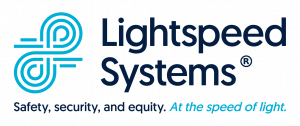Collaboration Assists in the Review of EdTech App Privacy Policies
AUSTIN, TEXAS, UNITED STATES, April 10, 2024 /EINPresswire.com/ — Today, Lightspeed Systems®, celebrating its twenty-fifth year as the global leader in providing digital safety, security, and equity solutions to K-12 education, announced in partnership with the Public Interest Privacy Center (PIPC), the publication of The K-12 Privacy Policy Guide: How to Quickly Spot Red Flags, a resource to help educators quickly discover issues in privacy policies that would likely restrict the tool from being used with students. The eBook guide is immediately available for download.
“Protecting students’ data privacy has become a significantly time-consuming task for school districts, and the costs continue to escalate,” said Amy Bennett, Chief of Staff at Lightspeed Systems. “The goal of our collaborative partnership with PIPC was to create a springboard resource to help school districts and teachers get started evaluating edtech application privacy policies with greater veracity and efficiency. We couldn’t be more excited to distribute this much-needed resource that will save administrators time and districts money.”
“School staff are facing an overwhelming number of requests to evaluate and approve edtech products, many of which lack sufficient safeguards to protect student data,” said Amelia Vance, President of PIPC and Chief Counsel of the Student and Child Privacy Center at AASA, the School Superintendents Association. “We developed this resource to help streamline the vetting process by empowering educators to do a quick first-round-of-review, looking for the common red flags in edtech privacy policies before submitting the product to be officially vetted by the school.”
Mitigating Data Privacy Risks Associated with Digital Learning
Digitally enabled classrooms have transformed the K-12 learning experience, and edtech applications deliver tremendous benefits for students and faculty. However, those same edtech applications pose additional threats to the protection of data privacy.
The K-12 Privacy Policy Guide: How to Quickly Spot Red Flags was written and published to help educators review any app’s privacy policy before seeking approval to use it with students. The K-12 Privacy Policy Guide: How to Quickly Spot Red Flags shares common red flags to look for in reviewing an application’s privacy policy that would make the app inappropriate to use with students without a separate written agreement between the school and technology provider.
To assist the app review process, The K-12 Privacy Policy Guide: How to Quickly Spot Red Flags lists key search terms to filter privacy policy documents that are often long and difficult to read and allows a reviewer to quickly navigate directly to areas that commonly contain data privacy concerns.
“If we want to improve student data privacy protection, then we need to make it possible for education stakeholders to identify potential warning signs hidden within privacy policies without a law degree,” continued Bennett. “This guide cuts out the fluff and will help administrators and teachers quickly identify apps that are unsafe for student data privacy.”
For more information about Lightspeed Systems and its services for the education sector, please visit https://www.lightspeedsystems.com.
About Lightspeed Systems
Lightspeed Systems® is dedicated to providing K–12 districts with time-saving solutions to create safe, secure, and equitable education, so they focus where it matters most—students and learning. Lightspeed Systems’ cloud-managed solutions; Security & Compliance, Safety & Wellness, and Engagement & Impact; are purpose-built for school networks and devices. Headquartered in Austin, Texas, Lightspeed Systems serves more than 23 million students using 15 million devices in 31,000 schools throughout 42 countries. To learn more, visit www.lightspeedsystems.com.
Ray Hartjen
Lightspeed Systems
+1 512-439-3995
email us here
Visit us on social media:
Facebook
Twitter
LinkedIn
YouTube
![]()





















